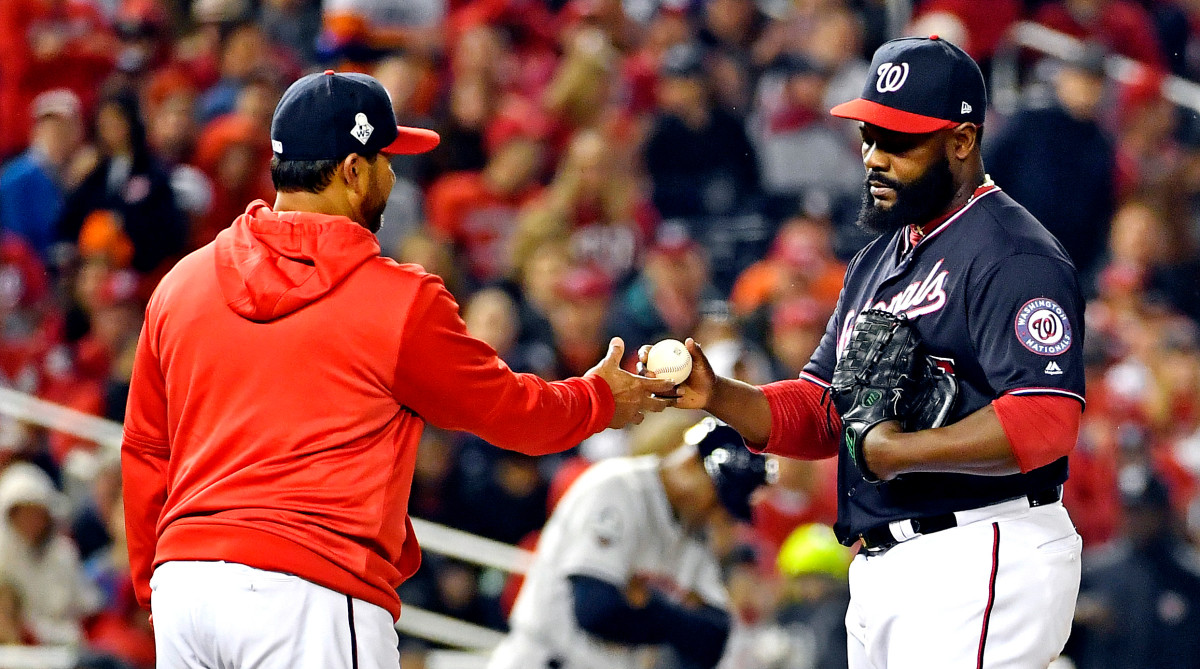Nationals Revert Back to Survival Mode After Squandering Two-Game World Series Lead


WASHINGTON — The Nationals’ original postseason motto—a hashtag, a rallying cry, an ethos—was modest: “Stay in the Fight.” It did not speak of entitlement or control or even of victory. Instead, it spoke simply of staying alive, which made for a sharp contrast with the aggressive bluster of the Astros’ “Take It Back.”
But, as the Nationals returned home with a 2-0 lead for Game 3, they tweaked the phrase: “Finish the Fight,” read the new one. It was printed on the red towels handed out to fans and on a navy banner fixed above the video board. The team had switched out one word and, in the process, dramatically altered the tenor of the phrase. It invited D.C. to imagine something beyond the basic act of survival now. It invoked an existence beyond the bare minimum. It dared to nod toward winning.
After an 8-1 loss in Game 4, however, the first motto seems a bit more suitable. The Nationals had ultimately all but rolled over in Game 3—turning to their second-string relievers after a middling performance by starter Aníbal Sánchez, which made sense, given the need to preserve the heart of the ‘pen for the next few games—and they found themselves resorting to the same strategy for Game 4. Starter Patrick Corbin let two runs on the board in an out-of-hand first and gave up a two-run homer in the fourth. The offense failed to work with runners on for the second game in a row. And Houston’s Alex Bregman hit a grand slam off reliever Fernando Rodney to serve as the final blow. The Nationals are still in the fight. But they’re now in a situation that feels far more like trying to stay in it than trying to finish it.
Bregman. Huge.
— SI MLB (@si_mlb) October 27, 2019
(via @mlb) pic.twitter.com/3EWTsrNuBw
“We’ve been here pretty much all year,” said Nationals skipper Davey Martinez. “So now it’s the best two out of three, right? We’ve got two of our big horses going in the next two games. We just come back.”
Game 4 started unraveling for the Nationals before they’d even had a chance to get to the plate. Corbin’s slider is typically his most used and most effective pitch. But Houston hit the slider better than any team in baseball during the regular season, and on Saturday, the pitch looked off from the start for Corbin, consistently getting away from him and failing to generate whiffs. His fastball, too, was getting put in play, and he allowed four hits to the first five batters. Corbin and catcher Yan Gomes realized they’d have to start mixing it up. On the seventh batter, Robinson Chirinos, he introduced his first change-up of the game, and he continued to mix it in, ultimately throwing twice as many as he does in a typical start. He cruised through the second and third. And then, in the fourth, he threw another change to Chirinos.
“We had some outs on it early with other hitters,” Corbin said. “And the location on that pitch wasn’t where I wanted it.”
He’d been aiming for down and away. But he put it “right down the middle,” he said, admittedly. Chirinos launched it for a two-run blast, his second homer in as many games.
That put the Nationals down 4-0—demoralizing, sure, but certainly not disabling. Yet the offense couldn’t do anything about it. After going 0-for-10 with runners in scoring position in Game 3, they went 1-for-9 in Game 4. Juan Soto rolled over on the first pitch twice and struck out once. Trea Turner was 0-for-5 and left five men on. Howie Kendrick went 0-for-4 with three strikeouts. They’ve looked so collectively lost that it’s possible to have an entire conversation on their failures without moving beyond the very basics.
Such as: How can they improve on that 1-for-19 with RISP?
“Get 2-for-20, 3-for-21, 4-for-22,” said Anthony Rendon. “Try to get better.”
And how, exactly, can they do that against this historically good pitching staff?
“We have these bats,” Rendon said, pulling his own from his locker for dramatic effect. “And usually you try to square it up on the baseball, and when you put it in the outfield grass, usually they’re hits.”
It was a tongue-in-cheek line from the famously sardonic third baseman, but it was also true. For most of the last two nights, Washington has looked as if it lacks an awareness of not only the mechanics of hitting but the goal of hitting.
Had the Nationals been going to finish the fight, Games 3 and 4 would have been the likeliest place to do it. They had one game against Zack Greinke, who, while certainly a tricky opponent, is a clear step behind this rotation’s top two starters, and another against José Urquidy, a 24-year-old rookie who’d made his major-league debut in July and was making his first postseason start after being relegated to relief in the ALDS and ALCS. These certainly wouldn’t be easy—Houston’s lineup is a terror regardless of who’s on the mound, and Greinke and Urquidy are still quality pitchers—but it was reasonable to expect they’d be easier than Games 1 and 2 against Gerrit Cole and Justin Verlander.
Surprise!
But, of course, the Nationals already have beaten Cole and Verlander. There’s also a potential advantage in the fact that they’ve have racked up plenty of looks against the Astros’ top relievers, while the Astros can’t say the same about the Nationals’ ‘pen. The task at hand for them is tall. But it’s certainly not impossible.
“The series is back at zero,” Rendon said. “We’re going to try to treat it like a regular-season series and try to win two out of three.”
They’re in the fight. They just have to stay there.
